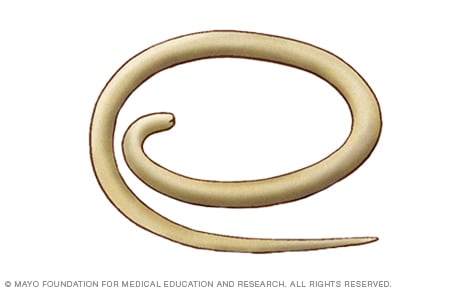Pinworm infection
Pinworm infection
overview
Pinworm

Pinworm
An adult pinworm is generally 1/4 to 1/2 inch (about 6 to 13 millimeters) long. The most common symptom of infection is anal itching, especially at night when worms migrate to the host's anal area to lay their eggs.
Pinworm infection is the most common form of intestinal worm infection in the United States and one of the most common worldwide. Pinworms are thin and white, measuring about 1/4 to 1/2 inch (about 6 to 13 millimeters) in length.
While the infected person sleeps, female pinworms lay thousands of eggs in the folds of skin around the anus. Most people infected with pinworms have no symptoms, but some people experience anal itching and restless sleep.
Pinworm infection is most common in school-age children, and the tiny (microscopic) eggs are easily transmitted from child to child. Treatment includes oral medications that kill the pinworms and thorough washing of pajamas, bedding, and underwear. For best results, the entire family should be treated.
Symptoms
Symptoms of a pinworm infection may include:
- Juckreiz im Anal- oder Vaginalbereich
- Schlaflosigkeit, Reizbarkeit, Zähneknirschen und Unruhe
- Gelegentlich Bauchschmerzen und Übelkeit
Pinworms often cause no symptoms.
When to go to the doctor?
Consult your doctor if you experience severe anal itching, especially at night.
Causes
Accidentally swallowing or inhaling pinworm eggs causes a pinworm infection. The tiny (microscopic) eggs can be carried into your mouth through contaminated food, drinks, or your fingers. After swallowing, the eggs hatch in the intestines and mature into adult worms within a few weeks.
Female pinworms move to the anal area to lay their eggs, often causing anal itching. When you scratch the itchy spot, the eggs stick to your fingers and get under your fingernails. The eggs are then transferred to other surfaces such as toys, bedding or toilet seats. The eggs can also be spread from contaminated fingers to food, liquids, clothing or other people.
Pinworm eggs can survive on surfaces for two to three weeks.
Risk factors
Risk factors for pinworm infection include:
- Jung sein. Madenwurminfektionen treten am ehesten bei Kindern im Alter von 5 bis 10 Jahren auf. Die winzigen (mikroskopisch kleinen) Eier werden leicht an Familienmitglieder, Betreuer oder andere Kinder in Schulen oder Kindertagesstätten weitergegeben. Madenwurminfektionen sind bei Kindern unter 2 Jahren ungewöhnlich.
- Leben in überfüllten Räumen. Menschen, die in Einrichtungen leben, haben ein höheres Risiko, Madenwurminfektionen zu entwickeln.
Complications
Typical pinworm infections do not cause serious problems. In rare cases, severe infestations can cause infection of the female genitals.
The parasite can travel from the anal area up the vagina to the uterus, fallopian tubes and around the pelvic organs. This can lead to problems such as inflammation of the vagina (vaginitis) and inflammation of the lining of the uterus (endometritis).
Although rare, other complications of a pinworm infection can include:
- Harnwegsinfektion
- Gewichtsverlust
- Infektion eines Teils des Abdomens (Peritonealhöhle)
prevention
Pinworm eggs can remain attached to surfaces such as toys, faucets, bedding, and toilet seats for two weeks. Therefore, in addition to regularly cleaning surfaces, methods to prevent the spread of pinworm eggs or reinfection include:
- Morgens waschen. Da Madenwürmer nachts ihre Eier legen, kann das Waschen des Analbereichs am Morgen helfen, die Anzahl der Madenwurmeier auf Ihrem Körper zu reduzieren. Duschen kann helfen, eine mögliche Rekontamination im Badewasser zu vermeiden.
- Unterwäsche und Bettzeug täglich wechseln. Dies hilft, Eier zu entfernen.
- In heißem Wasser waschen. Waschen Sie Bettwäsche, Schlafanzüge, Unterwäsche, Waschlappen und Handtücher in heißem Wasser, um Madenwurmeier abzutöten. Bei starker Hitze trocknen.
- Nicht kratzen. Vermeiden Sie es, den Analbereich zu kratzen. Kürzen Sie die Fingernägel Ihres Kindes, damit die Eier weniger Platz zum Sammeln haben. Schlagen Sie Ihrem Kind vor, das Nägelkauen zu vermeiden.
- Wasche deine Hände. Um das Risiko, eine Infektion zu bekommen oder zu verbreiten, zu verringern, waschen Sie sich nach dem Toilettengang oder dem Windelwechsel und vor dem Essen gründlich die Hände.
Sources:
- Parasiten – Enterobiasis (auch als Madenwurminfektion bekannt). Zentren für die Kontrolle und Prävention von Krankheiten. https://www.cdc.gov/parasites/pinworm/. Abgerufen am 6. Mai 2020.
- Leder K, et al. Enterobiasis (Madenwurm) und Trichuriasis (Peitschenwurm). https://www.uptodate.com/contents/search. Abgerufen am 6. Mai 2020.
- Fragen Sie MayoExpert. Madenwurm (Enterobius vermicularis)-Infektion. Mayo-Klinik; 2020.

 Suche
Suche
 Mein Konto
Mein Konto